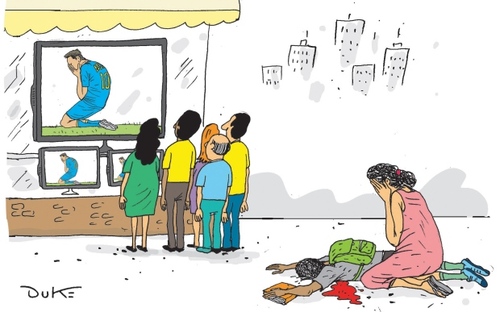Ao vivo direto da Rússia: a Copa do Mundo formatada para televisão
Conteúdo do artigo principal
Resumo
Como megaevento esportivo, a Copa do Mundo tem uma grande capacidade de gerar atenção da Mídia. Entre os diferentes tipos de suporte, a televisão é o veículo mais relevante na difusão do futebol, tendo desenvolvido uma relação de simbiose com as organizações esportivas. Consciente da importância desse relacionamento, desde a década de 1960, a FIFA investe bastante da sua atenção na transmissão televisiva da Copa do Mundo, seu principal produto e sua maior fonte de recursos financeiros. Através da análise da versão de 2018 do Manual de Produção para TV da FIFA, pretendemos ver de que maneira a instituição contribui para a transformação da Copa do Mundo em um produto de televisão. Os resultados mostram que a FIFA passa a incorporar a lógica da mídia em suas ações e é responsável pela forma como a Copa do Mundo é transmitida para as emissoras oficiais.
Downloads
Detalhes do artigo
Seção
Autores que publicam nesta revista concordam com os seguintes termos:
1. Autores mantém os direitos autorais e concedem à revista o direito de primeira publicação, com o trabalho simultaneamente licenciado sob a Licença Creative Commons Attribution que permite o compartilhamento do trabalho com reconhecimento da autoria e publicação inicial nesta revista.
2. Autores têm autorização para assumir contratos adicionais separadamente, para distribuição não-exclusiva da versão do trabalho publicada nesta revista (ex.: publicar em repositório institucional ou como capítulo de livro), com reconhecimento de autoria e publicação inicial nesta revista.
3. Autores têm permissão e são estimulados a publicar e distribuir seu trabalho online (ex.: em repositórios institucionais ou na sua página pessoal) a qualquer ponto antes ou durante o processo editorial, já que isso pode gerar alterações produtivas, bem como aumentar o impacto e a citação do trabalho publicado (veja O Efeito Acesso Livre).
Como Citar
Referências
ALTHEIDE, David. Media logic and political communication. Political Communication, v. 21, n. 3, p. 293-296, 2004.
ALTHEIDE, David; SNOW, Robert. Media logic. Hills: Sage, 1979.
BILLINGS, Andrew; WENNER, Lawrence. The curious case of the megasporting event: media, mediatization and seminal sports events. In: WENNER, Lawrence; BILLINGS, Andrew (ed.) Sport, Media and Mega-Events. Londres: Routledge, 2017, p. 3-18.
BORGES, Fernando. O papel da FIFA Fan FestTM na copa do mundo da África do Sul. Horizontes Antropológicos, v. 19, n. 40, p. 201-230, 2013.
COULDRY, Nick; HEPP, Andreas. Conceptualizing mediatization: contexts, traditions, arguments. Communication Theory, v. 23, n. 3, p. 191-202, 2013.
FIFA. Who we are. Disponível em: . Acesso em: 14 ago. 2018.
FIFA. FIFA World Cup TV Production Handbook. Zurique: FIFA, 2018.
FRANDSEN, Kirsten. Sports organizations in a new wave of mediatization. Communication & Sport, v. 4, n. 4, p. 385-400, 2016.
GRUNEAU, Richard; HORNE, John. Mega-events and globalization: a critical introduction. In: GRUNEAU, Richard; HORNE, John. (ed.) Mega-events and Globalization: capital and spectacle in a changing world order. Londres: Routledge, 2016, p. 1-28.
HAYNES, Richard; BOYLE, Raymond. The FIFA World Cup: media, football and the evolution of the global event. In: WENNER, Lawrence; BILLINGS, Andrew. (ed.) Sport, Media and Mega-events. London: Routledge, 2017, p. 69-99.
HELLAND, Knut. Changing sports, changing media: mass appeal, the sports/media complex and TV sports rights. Nordicom Review, p. 105-119, 2007.
HJARVARD, Stig. The mediatization of society: A theory of the media as agents of social and cultural change. Nordicom Review, v. 29, n. 2, p. 105-134, 2008.
HORNE, John; MANZENREITER, Wolfram. An introduction to the sociology of sports mega-events. The Sociological Review, v. 54, n. 2, p. 1-24, 2006.
HORNE, John; MANZENREITER, Wolfram. Football World Cup finals on the host countries Japan/Korea accounting for mega-events: forecast and actual impacts of the 2002. International Review of Sociology of Sport, v. 39, n. 2, p. 187-203, 2004.
KROTZ, Friedrich. The meta-process of “mediatization” as a conceptual frame. Global Media and Communication, v. 3, n. 3, p. 256-260, 2007.
MARIVOET, Salomé. Euro 2004TM: um evento global em Portugal. Lisboa: Livros Horizonte, 2006.
MÜLLER, Martin. What makes an event a mega-event? Definitions and sizes. Leisure Studies, v. 34, n. 6, p. 627-642, 2015.
PAPA, Françoise. Quand le sport nous parle de la télévision. In: GABASTON, Pierre; LECONTE, Bernard (org.) Sports et télévision: regards croisés. Paris: L’Harmattan, 2000, p. 405-425.
ROCHE, Maurice. Mega-events and Modernity: Olympics and Expos in the Growth of Global Culture. Londres: Routledge, 2000.
ROCHE, Maurice. Mega-events, time and modernity: on time structures in global society. Time and Society, v. 12, p. 99-126, 2003.
ROWE, David. Sport, Culture and the Media: the unruly trinity. Berkshire: Open University Press, 2004.
ROWE, David. The global love-match: sport and television. Media, Culture & Society, v. 18, n. 4, p. 565-582, 1996.
WENNER, Lawrence. Media, sports, and society: The research agenda. In: WENNER, Lawrence. (org.) Media, sports, and society. Newbury Park: Sage, 1989, p. 13-48.
WHANNEL, Garry. Fields in Vision: Television Sport and Cultural. Transforrmation. Routledge, London, 1992.
WILLE, Fabien. Une diachronie du spectacle sportif télévisé: des logiques d'innovations et de promotions. In: GABASTON, Pierre; LECONTE, Bernard (org.) Sports et télévision: regards croisés. Paris: L’Harmattan, 2000, p. 427-442.
